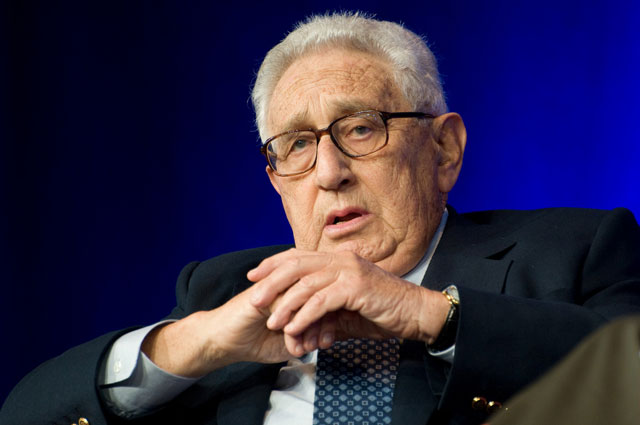
Former Secretary of State Henry Kissinger wonders whether something like the opening to China he and President Nixon undertook would be possible today. He believes that the U.S. government is "too complex" these days, with "too many urgent things" forcing a focus on the everyday and preventing bold, strategic moves. Furthermore, even if a strategic thinker were able to undertake a bold initiative, "bureaucratic disputes" would almost surely bog the process down.
Bringing in brilliant outsiders is no panacea either, Kissinger observed. They have a tendency to get seduced by suddenly being thrust into positions of power and have little appetite to do the drudgery of working the interagency process.
He made these remarks in an informal session of journalists and bloggers hosted by former Secretary of Defense Donald Rumsfeld (who Kissinger famously described as "an occasional adversary and a permanent friend") on the occasion of Kissinger’s latest bestseller, On China. The event was organized by Keith Urbahn, Rumsfeld’s chief of staff, who gained 15 minutes of fame for breaking the news of Osama bin Laden’s killing on Twitter.
On the subject of his book, Kissinger is obviously passionate. Since brokering the thaw in Sino-American relations in a secret mission whose fortieth anniversary will come next month, he has made some seventy trips to China. He had intended this book to be a breezy collection of anecdotes on those visits but he soon came to realize that he wanted to put the relationship into a broad, historical context. This required substantial archival research, culminating into a 608 page volume. Which, as with all his other books, he wrote longhand.
The great statesman argues that, while China is not likely to adopt anything like Western-style democracy any time soon, maintaining "tolerable relations" between the two great powers is vital to addressing emerging problems ranging from climate change to cyber security, which he contends are "only soluble on a global basis."
Unfortunately, this became more difficult in the wake of the global financial crisis. The Chinese, who have long had an ethnocentric approach that viewed outsiders as "barbarians," had come to respect the United States as, if not an equal, a formidable power. The economic collapse and flailing policy responses have "undermined their sense that we knew what we were doing" on the economic front, where they conceded that the United States was superior.
Questioners were unable to goad him into the partisan political fray. Asked about Jon Huntsman, who recently resigned his post as US ambassador to China and is expected to run for president, Kissinger stated his view that Huntsman had been "a very good ambassador" and was "a very intelligent man." Pressed for an endorsement, Kissinger stopped short, joking that "I normally don’t endorse candidates, and part of the reason is that when I endorse a candidate, he loses." He simply reiterated that Huntsman was able and "well poised."
Additionally, he allowed that it was his hope that the Republican Party would nominate someone with a reasonable foreign policy, presumably meaning someone who shares his pragmatic Realism. Along those lines, he continues to be "available for foreign policy advice" but, at age 88, not interested in a formal role in government.
Asked about the Obama administration’s handling of China, Kissinger quipped that "Obama was my second choice" in the previous election. Still, he thought that the administration’s handling of Chinese relations had generally been "reasonable." He lamented that, while they had "managed the day to day" issues well, they’ve done so "without a focus on the next stage."
James Joyner is managing editor of the Atlantic Council.
Image: HenryKissinger.jpg
